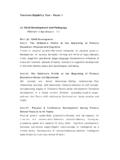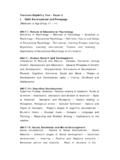Transcription of I. Child Development and Pedagogy 30 Marks
1 1 Syllabus of TET (V-VIII) , 2013 (for Pass/Honors/PG ) : I. Child Development and Pedagogy 30 Marks a) Child Development (Elementary School Child ) Concept of Development and its relationship with learning Principles of the Development of children Influence of Heredity & Environment & Religious thought. Socialization processes: Social world & children (Teacher, Parents, Peers) Piaget, Kohlberg and Vygotsky: constructs and critical perspectives Concepts of Child -centered and progressive education Critical perspective of the construct of Intelligence Multi Dimensional Intelligence Language & Thought & Religious thought. Gender as a social construct; gender roles, gender-bias and educational practice Individual differences among learners, understanding differences based on diversity of language, caste, gender, community, religion etc.
2 Distinction between Assessment for learning and assessment of learning; School- Based Assessment, Continuous & Comprehensive Evaluation: perspective and practice Formulating appropriate questions for assessing readiness levels of learners; for enhancing learning and critical thinking in the classroom and for assessing learner achievement. b) Concept of Inclusive education and understanding children with special needs Addressing learners from diverse backgrounds including disadvantaged and deprived with reference to social backgrounds . Addressing the needs of children with learning difficulties, 'impairment' etc Addressing the Talented, Creative, Specially abled Learners c) Learning and Pedagogy Questions How children think and learn; how and why children 'fail' to achieve success in school Performance with reference to social factors.
3 Basic processes of teaching and learning; children's strategies of learning; learning as a social activity; social context of learning. Child as a problem solver and a 'scientific investigator' Alternative conceptions of learning in children; understanding children's 'errors' as significant steps in the learning process. Cognition & Emotions Motivation and learning with reference to religious thought. Factors contributing to learning personal & environmental with reference to social factors .2 II. Language I. 30 Marks a) Language Comprehension Questions Reading unseen passages- two passages one prose or drama and one poem with questions on comprehension, inference, grammar and verbal ability (Prose passage may be literary, scientific, narrative or discursive) b) Pedagogy of Language Development Questions Learning and acquisition Principles of language Teaching Role of listening and speaking; function of language and how children use it as a tool Critical perspective on the role of grammar in learning a language for communicating ideas verbally and in written form; Challenges of teaching language in a diverse classroom.
4 Language difficulties, errors and disorders Language Skills Evaluating language comprehension and proficiency: speaking, listening, reading and writing Teaching-learning materials: Textbook, multi-media materials, multilingual resource of the classroom Remedial Teaching III. Language- II 30 Marks a) Language Comprehension Questions Reading unseen passages- two passages one prose or drama and one poem with questions on comprehension, inference, grammar and verbal ability (Prose passage may be literary, scientific, narrative or discursive) b) Pedagogy of Language Development Questions Learning and acquisition Principles of language Teaching Role of listening and speaking; function of language and how children use it as a tool Critical perspective on the role of grammar in learning a language for communicating ideas verbally and in written form; Challenges of teaching language in a diverse classroom.
5 Language difficulties, errors and disorders Language Skills Evaluating language comprehension and proficiency: speaking, listening, reading and writing Teaching-learning materials: Textbook, multi-media materials, multilingual resource of the classroom Remedial Teaching 3 IV. Arts & Social Science Group 60 Marks a) Geography, History and other related Arts subjects upto class- X standard as per syllabus of WBBME, WBBSE, CBSC, ICSC board or equivalent. OR IV. Mathematics & Science Group 60 Marks a) Mathematics, Physical Science, Life Science, and other related science subject upto class X standard as per syllabus of WBBME, WBBSE, CBSC, ICSC board or equivalent. Syllabus of TET,2013 (for Under Graduate category) : I. Child Development and Pedagogy 30 Marks a) Child Development (Elementary School Child ) Concept of Development and its relationship with learning Principles of the Development of children Influence of Heredity & Environment & Religious thought.
6 Socialization processes: Social world & children (Teacher, Parents, Peers) Piaget, Kohlberg and Vygotsky: constructs and critical perspectives Concepts of Child -centered and progressive education Critical perspective of the construct of Intelligence Multi Dimensional Intelligence Language & Thought & Religious thought. Gender as a social construct; gender roles, gender-bias and educational practice Individual differences among learners, understanding differences based on diversity of language, caste, gender, community, religion etc. Distinction between Assessment for learning and assessment of learning; School- Based Assessment, Continuous & Comprehensive Evaluation: perspective and practice Formulating appropriate questions for assessing readiness levels of learners; for enhancing learning and critical thinking in the classroom and for assessing learner achievement.
7 B) Concept of Inclusive education and understanding children with special needs Addressing learners from diverse backgrounds including disadvantaged and deprived with reference to social backgrounds . Addressing the needs of children with learning difficulties, 'impairment' etc Addressing the Talented, Creative, Specially abled Learners c) Learning and Pedagogy Questions 4 How children think and learn; how and why children 'fail' to achieve success in school Performance with reference to social factors. Basic processes of teaching and learning; children's strategies of learning; learning as a social activity; social context of learning. Child as a problem solver and a 'scientific investigator' Alternative conceptions of learning in children; understanding children's 'errors' as significant steps in the learning process.
8 Cognition & Emotions Motivation and learning with reference to religious thought. Factors contributing to learning personal & environmental with reference to social factors .II. Language I. 30 Marks a) Language Comprehension Questions Reading unseen passages- two passages one prose or drama and one poem with questions on comprehension, inference, grammar and verbal ability (Prose passage may be literary, scientific, narrative or discursive) b) Pedagogy of Language Development Questions Learning and acquisition Principles of language Teaching Role of listening and speaking; function of language and how children use it as a tool Critical perspective on the role of grammar in learning a language for communicating ideas verbally and in written form; Challenges of teaching language in a diverse classroom.
9 Language difficulties, errors and disorders Language Skills Evaluating language comprehension and proficiency: speaking, listening, reading and writing Teaching-learning materials: Textbook, multi-media materials, multilingual resource of the classroom Remedial Teaching III. Language- II 30 Marks a) Language Comprehension Questions Reading unseen passages- two passages one prose or drama and one poem with questions on comprehension, inference, grammar and verbal ability (Prose passage may be literary, scientific, narrative or discursive) 5 b) Pedagogy of Language Development Questions Learning and acquisition Principles of language Teaching Role of listening and speaking; function of language and how children use it as a tool Critical perspective on the role of grammar in learning a language for communicating ideas verbally and in written form; Challenges of teaching language in a diverse classroom.
10 Language difficulties, errors and disorders Language Skills Evaluating language comprehension and proficiency: speaking, listening, reading and writing Teaching-learning materials: Textbook, multi-media materials, multilingual resource of the classroom Remedial Teaching (iv) Mathematic : Class VI to X standard (For General UG) 30 Marks OR ARABIC (For Arabic UG) Arabic A. Classical Prose 1. Majaniul Adab (PP. 107-121) Text Book prescribed : University Arabic Selection : published by Calcutta University, third edition( 1968) B. Modern Prose 1. Nahadatul LughatilArabiya( ) Text Book prescribed : Pass Arabic Selection (Prose ) published by Calcutta University, First Edition (1968) C. Classical Poetry 1. Al-babuthThalith( ) Text Book prescribed : Pass Arabic Selection : published by Calcutta University, T Third Edition (1988) D.









